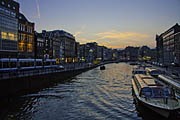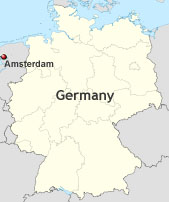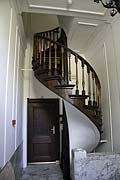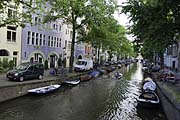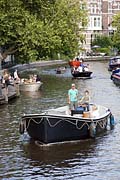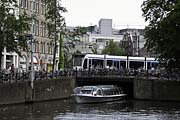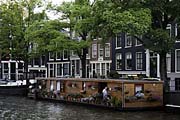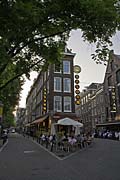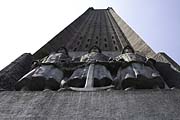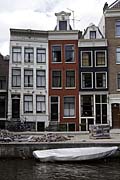Old Retired Guy Blog

June 25 - 28, 2010
Click on any of the photos
Return to the
|
Amsterdam (Page 1 of 3)Note: This is part 1 of the authorized edition of The Anderson's European Vacation, not to be confused with National Lampoon's European Vacation. * * * * * Flying from west to east you always lose a lot of time. In our case, seven hours. So, the night was very short and when our flight landed in Amsterdam it was 7:30 AM. We emerged from the Airbus 330 and followed the crowd into Schiphol Airport. After finding our bags, we went to customs. We were neither frisked nor scanned. The customs guy simply looked at our passports, looked at us, and then stamped the passports. We were free to enter the Netherlands. Actually, we were free to enter the entire European Union.
So, it was no surprise to see canals in Amsterdam. But, man, there are canals everywhere! According to a local, there are over 100 kilometers of them; that's ... hmmm, let me see, multiply by 5, divide by 8, take the square root, add pi ... I think about 62 miles! The result is a city with something like 90 islands and 1500 bridges. (This is good stuff. I should be a tour guide.)
The canals aren't just for cruising, many locals make their home on them. According to Jurjen Heeck's Houseboat Page, about 2400 families live in houseboats on the canals in Amsterdam. Many of these are connected to city services, so they can be very comfortable though not readily moveable. The city does not allow new permits for houseboats so they are no longer a cheap place to live.
Of course, there's also a lot of interesting stuff on the land between the canals. The streets are lined with sidewalk cafes. It doesn't get dark until about 11 PM, so they're a great place to hang out and have a beer on a warm summer evening. Since the World Cup was in progress, most of the sidewalk cafes had televisions set up outside so their patrons wouldn't go somewhere else to watch the games. The residential areas are packed with quaint houses that are centuries old. They're narrow because the taxes for waterfront properties used to be based on the width of the property. Some of the old houses look a bit crooked. I'm not sure if they were built that way or if subsidence played a role.
'Amsterdam' |


